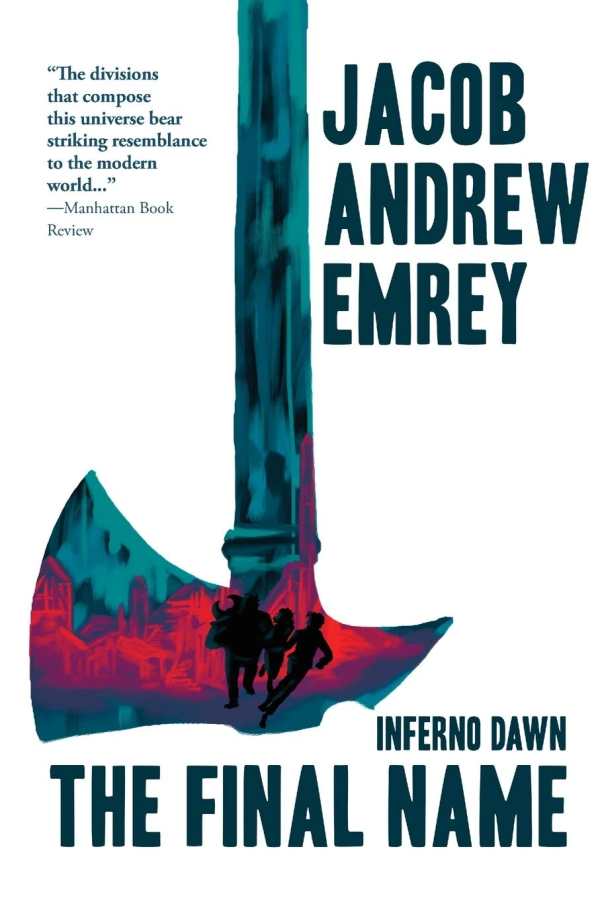
Inferno Dawn
The Final Name
Inferno Dawn: The Final Name is a dark, intriguing fantasy populated by intense characters.
In Jacob Andrew Emrey’s fantasy adventure Inferno Dawn: The Final Name, difficult moral issues are considered in a world that’s divided by war and that’s on the edge of modernization.
Human beings won The Great War—not with magic or strategic prowess, but because of industrial evolution and technological innovation. A century later, the ruling Dartmoth family oversees the continued subjugation of elves and orcs as human beings prosper and use airplanes, automobiles, and firearms.
In the sin-laced town of Silverfell, Dryden, a human, starts a barroom brawl over an ethereal female elf, Astanava, and a corrupt human official, forcing him out of the city and landing the elf in prison. Meanwhile, the city of Osh comes under fire as the king sends a force to destroy a mystical book and any remaining artifacts, prompting the sheriff, an orc named Fane, to hide his family’s heirloom ax while preparing for a possible showdown.
Astanava endures hell in prison, but a latent ancestral ability unseen for centuries kicks in and leads to a bloody revolution headed by the mistreated elven prisoners and guards. A sinister royal plot drives Dryden to join forces with Fane and Astanava in the hopes of hedging another war or winning it before it starts.
As characters interact with the people and places around them, the world becomes clear. Dryden’s time spent exploring Silverfell and other notorious cities results in juxtaposed views: of the grandeur of the human capital with the deteriorating nonhuman cities. The inclusion of modern day elements—characters wear Stetsons, and there are mentions of real-world cities—is jarring, though, and the world’s geography is not clarified.
Dryden, Fane, and Astanava all narrate, resulting in rounded views of the action and showcasing how each interacts with society and how society treats them. Fane has difficulty enforcing the law as a nonhuman sheriff, while Dryden refuses to toe the family line. Astanava is driven to protect her self-claimed sister as both are mistreated. Astanava is the most engaging of the three. Her shocking transformation—from an abused bar worker to a prisoner to a leader capable of a drastic and violent revolution—finds her building upon her mistakes but maintaining a consistent center. Her path is an uncomfortable one, both for her and to follow along with, but the power she grapples with makes her able to right wrongs and change the fate of her people, albeit at a violent, bloody price. Fane and Dryden deal with more typical family dramas, though theirs have ramifications for human and orcs alike.
While the characters converse in compelling ways—Dryden waxes poetic while drunk; Astanava is clipped and precise, but delivers some powerful longer speeches—the book’s inclusion of spirit that speaks only to Astanava stands out and leads to a gasp-inducing moment. Elaborate scene setting means that even the book’s darker moments—rape, violence, and hate speech toward the nonhuman races are included—hold attention.
At the book’s end, the looming threat to nonhumans remains, while a dramatic last-minute reveal leads to tense stopping points for the central trio. Inferno Dawn: The Final Name starts off a dark and intriguing fantasy series that’s populated by intense characters.
Reviewed by
John M. Murray
Disclosure: This article is not an endorsement, but a review. The publisher of this book provided free copies of the book and paid a small fee to have their book reviewed by a professional reviewer. Foreword Reviews and Clarion Reviews make no guarantee that the publisher will receive a positive review. Foreword Magazine, Inc. is disclosing this in accordance with the Federal Trade Commission’s 16 CFR, Part 255.
